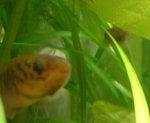This has always plagued me. I want the best for my fish, and thus have a terrible conundrum of what to do with my clown loaches in the future. Well, interestingly enough yesterday I received three killifish that are the same species as my current four Killifish (I wanted more females but received a male as well). These new killies are about a fourth the size of my current ones, including the fully colored up male! They are teeny tiny. My four current Killies are kept in a 20 long all to themselves, and I know that most Killifish keepers keep their killies in small tanks.
So....long story short....I assume the very tiny size of my new killies is attributable to being raised in a small container/tank. Does small tanks contribute to a lessened life span or just simply a smaller size? I'm a small individual but that doesn't mean necessarily that my life span will be less than say a 6' person (I hope!!!). Although genetics are the main reason I'm small, I can say diet had a very large impact on my life as a youngster, maybe even 'stunting' me a bit? Who knows? I'm shorter than my parents anyway....
OK, so, does it matter? Will my clown loaches have a short lifespan in a 55 gallon tank? Will my killies have a longer lifespan in a larger tank -- all things being equal?


What do you think?
So....long story short....I assume the very tiny size of my new killies is attributable to being raised in a small container/tank. Does small tanks contribute to a lessened life span or just simply a smaller size? I'm a small individual but that doesn't mean necessarily that my life span will be less than say a 6' person (I hope!!!). Although genetics are the main reason I'm small, I can say diet had a very large impact on my life as a youngster, maybe even 'stunting' me a bit? Who knows? I'm shorter than my parents anyway....
OK, so, does it matter? Will my clown loaches have a short lifespan in a 55 gallon tank? Will my killies have a longer lifespan in a larger tank -- all things being equal?
What do you think?





